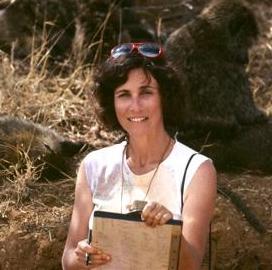Shirley C. Strum
- Profile
- Websites
Profile
Shirley C. Strum received her doctorate in anthropology from the University of California, Berkeley. A biological anthropologist specializing in primate studies, conservation, and science studies, Strum has studied one population of baboons in Kenya for 38 years. During that time her research has focused on:
- Aggression and male dominance
- Sex roles and social organization
- Social strategies of competition and defense
- Cognition in the wild
- Socioecology, and the use of nonhuman primate behavior in evolutionary interpretations
Since 1979, she has also been involved in conservation, studying the development of crop-raiding by baboons and techniques for controlling pest primates, exploring translocation as a conservation tool, and developing and implementing "community-based conservation" techniques.
Her conservation interests include environmental ethics, concepts of nature, cultural issues involved in modern conservation and evolution of social complexity. She teaches "Conservation and the Human Predicament", a course with a multi-disciplinary approach.
Strum's study group, the Pumphouse Gang, have been featured in numerous television documentaries including Survival Anglia's "History of the Pumphouse Gang" and "Moving Day for the Pumphouse Gang," National Geographic's "Among the Baboons," Canadian Broadcast Company's "Monkey Business," and Discovery's "Baboon Tales" narrated by Glen Close, which has won a number of international awards. Her work is featured in africaquest.classroom.com, a resource for parents, teachers and schoolchildren.
Strum has designed a series of juvenile fiction adventure books, "Wild Things," written by award-winning author, Elizabeth Laird. Each book is the story of an African animal and the conservation issues surrounding its life. Strum has also been involved in a variety of special exhibits.
In addition to a variety of professional journals her work can also be seen inThe National Geogaphic Magazine, Natural History, and Wildlife Conservation. Almost Human (originally published by Random House, 1987, and currently in paperback by Norton and in foreign language editions in French, German, Italian, Swedish, Finnish and Japanese) presents the unfolding scientific drama of the baboon research.
Strum has collaborated with Bruno Latour and more recently with Linda Fedigan to explore the special place of primate studies in science and in society (See Primate Encounters: Models of Science, Gender, and Society, 2000, University of Chicago Press). Some of the conservation work can be found in Natural Connections: Perspectives in Community-based Conservation, edited by D. Western, R. Wright and S.C. Strum (1994, Island Press).
Strum divides her year between Kenya and UCSD and is resident for the Spring term only.
Websites
Baboons R Us: http://www.baboonsrus.com/
African Conservation Centre: http://www.africanconservationfund.org/
Conservation Africa: http://www.conservationafrica.org/
